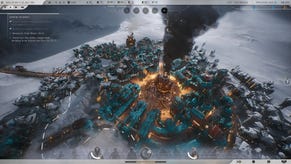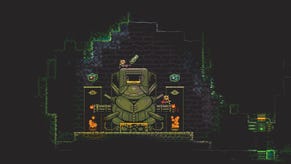The AI That Designs Its Own Games
Angelina’s Jollies
A picture of Barack Obama flashes up on the screen. There’s a big, warm smile on his face, but in the background there’s the sound of a helicopter gunship firing. "I searched for happy photos of Obama," says Angelina, the game's creator, "because I like him."
Angelina makes computer games. I guess you could call her an indie developer of sorts - her games certainly exist away from the big-budget mainstream industry, and she doesn’t have a huge team at her disposal. Like many indie developers, she seeks to inject her games with meaning and purpose, and tackle issues that other releases stray away from. There's just one difference between her and most creatives working in the field.
Angelina isn't a human being. She's a computer program.
Angelina is the work of Michael Cook, a researcher at Imperial College London and, crucially, an avid RPS reader. She's his PhD project, and with her, Michael intends to explore new possibilities in autonomous game development.
"The aim is just to investigate whether we can get artificial intelligence to design videogames," explains Michael, "but to take on as much responsibility as possible - to really do every aspect of design, if it can. And that's really interesting for us, from two perspectives - first, to see if it can be done in a way that produces good games, and also there's a more philosophical question, which is: how can you get computers to produce artifacts of cultural relevance?"

The system works like this. At the push of a button, Angelina heads to the Guardian website and scans the top five news articles. She picks one, then sets about designing a game. She scans the text for relevant names, places and topics, then heads to Google Images to find art assets for the game, and free audio libraries to provide music and sound effects that suit the article's mood.
She also makes value judgements. Angelina scans Twitter to see what people think of the names referenced in the text. If people are using positive adjectives in conjunction with the name Barack Obama, for example, she'll Google smiley happy pictures of the American President. If she notices people aren't especially taken by Angela Merkel, she'll search for pictures with a frown.
And after all that, Angelina turns everything into a platform game, iterating levels and enemies and assets via a method known as computational evolution until she finds the 'best' fit. Once everything's finished, Angelina sends Mr. Cook a friendly email saying her work's done, and explaining why she made what she did.
The project certainly isn’t complete yet - “obviously we’re a long way from cultural relevance,” says Michael - but it’s already producing some fascinating games and delivering some wonderful and bizarre surprises.
Firstly, Angelina’s opinions of people aren’t always - shall we say - the most refined. “For instance,” says Michael, “the other day, I noticed that she’d made a game about the Syrian conflict, and Angelina said that her opinion of Bashar al-Assad had changed, and that she liked Bashar al-Assad. I have no idea what made her have that opinion.”
Meanwhile, a game about Rupert Murdoch delivered some unexpected results when Angelina said she thought the much-maligned NewsCorp boss to be a very responsible man. Turns out, a lot of people on Twitter were saying Murdoch was “responsible for” certain misdemeanours, and Angelina got the wrong end of the stick.

Then there are the games themselves. Take, for example, the one that featured a picture of Nicolas Sarkozy which, when your character walked past it, emitted the sound of a horse neighing very loudly. Or the game that Angelina created after scanning an article about the Eurozone crisis, whose background artwork featured pictures of coins and bankers, but whose soundtrack blasted cheesy European disco music into your ears.
“To me, that type of music reminds me of really, really packed holiday destinations,” says Michael, “so it really contrasted with the fact that this was a game about complete financial ruin. But it was the title that set it off. It was one of the best things Angelina has come up with, I think.”
Not only does Angelina design and develop her own games, she also names them. Michael coded a pun creation algorithm, which allows Angelina to pick out key words from the chosen article, and find which ones rhyme with items of cultural relevance - such as the titles of famous novels, movies or videogames.

Angelina called the Eurozone game: ‘France France Revolution’.
But for all the unpredictable silliness that has emerged from this project, there have also been titles that evoke deeper emotions. As odd as it might sound, Angelina has started to create what some might think of as “art”.
While she might not know it, a smiling Obama layered over sounds of war and pictures of Afghanistan has some pretty powerful connotations: if this were a game made by a human being, you can bet a lot of people would be examining the statements it made. And then there was the game that Michael is reluctant to talk about, and certainly to showcase publicly: Angelina named it Sex, Lies and Rape.
“It was a very powerful example of what Angelina can do,” Michael says hesitantly. “What happens at the end is that a Renaissance painting flashes up of a rape - it was a favourite topic, seemingly - but that felt very appropriate because [the Guardian story Angelina chose] was about the abuse of children. It was a very serious topic. There were so many images that Angelina could have chosen by accident through Google Images that really would have destroyed the game. The fact that it came out so perfectly was an act of luck, but it really is a great example of where we want the system to go.”
The next steps will involve getting Angelina to talk in more detail about the games she makes - and she’s already made a start on her very own website. (A side note: Michael seems to make a point of referring to Angelina as “she”, something I ask him about. “It’s really tempting to drop those things in!” he says. “[It’s because], in a sense, Angelina is starting to have a discussion with the people that view its stuff. But I haven’t been getting too chummy with it. Yet.”)
Framing information, as this technique is called, is becoming a common theme in computational creativity research. “It’s like in a gallery, if you look at a piece of artwork, you might see a little piece of text next to it that explains to you a bit about the background and why it was made. And the reason that's interesting for software like Angelina is that it gives people an understanding that there's more than just a random number generator behind this. Angelina chooses angry-looking pictures of Angela Merkel because Angelina /doesn't like/ Angela Merkel. And being able to justify these things is important - it shows why Angelina's worthwhile, that Angelina's more creative.”

There are many other plans for the future. As well as tweaking the ways in which Angelina forms opinions, Michael wants to develop the ability for her to create games of multiple genres and, eventually, pick which type of game to make based on the ‘feel’ of her source article. France France Revolution, for example, might work better as a rhythm action game - and the idea is that Angelina would be able to arrive at this conclusion herself.
But for all Michael hopes that Angelina will begin to create items of real cultural relevance, he sees a more likely - and arguably more useful - path for the technology to take: assisted game development.
Imagine a level editing suite that helps you design levels. As you’re creating a map, the software is tweaking and optimising it on the fly, suggesting optimum placement of enemies and power-ups. This sort of technology is already being researched, and the aim is for it to help the games industry create better games more efficiently, as well as offering an easy way for hobbyists to make games themselves.
There’s also another, perhaps more important, way in which Michael hopes Angelina might be of benefit. “We're producing a system that has creative abilities based on what a human does, but technical abilities based on a computer's strengths,” explains Michael. “What I'm hoping is that research like Angelina, as well as other projects, will lead to systems which can generate games that we can't conceive of right now. They will invent new genres, new mechanics, new ways of interacting with virtual worlds - and they'll be able to develop these games, and prototype them, and decide if they're fun, without humans necessarily being involved.”

That’s not because humans shouldn’t be involved, Michael is keen to stress. We shouldn’t be tearing down development studios left, right and centre. It’s simply because AI is capable of things that humans aren’t.
“That's pretty much always been the way, and will continue to be the way in the future. And if that can mean games which were unthinkable, I think that could be an amazing thing for the industry. Right now Angelina's making quite strange platformers featuring notable politicians. But, you know, maybe 20 or 30 years from now, you'll be able to wake up every morning and witness the birth of a genre. That's the dream, I guess."
The reality, acknowledges Michael, will likely be somewhat more humble. But Angelina is already sparking in-depth discussions about game design, creative intent, and whether or not art even needs to be made by a human being. I’d argue it’s of cultural relevance already.









